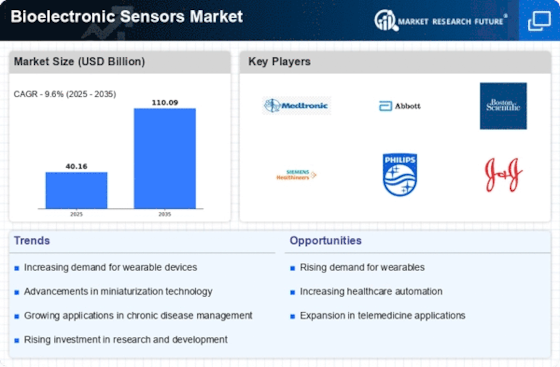Market Trends
Key Emerging Trends in the Bioelectronic Sensors Market
The Bioelectronic Sensors Market is characterized by several noteworthy trends that are shaping its trajectory and influencing the industry landscape. One prominent trend is the increasing integration of wearable bioelectronic sensors in healthcare. These sensors, incorporated into wearable devices such as smartwatches and fitness trackers, enable continuous monitoring of vital signs, offering real-time health data to users. This trend not only empowers individuals to take charge of their health but also provides healthcare professionals with valuable insights for preventive care and early intervention.
Another significant trend in the Bioelectronic Sensors Market is the emphasis on miniaturization and portability. As technology advances, there is a growing demand for smaller, lightweight bioelectronic sensors that can be easily integrated into various medical devices and applications. This trend aligns with the need for non-invasive and convenient monitoring solutions, contributing to the development of more accessible healthcare technologies.
The shift towards point-of-care diagnostics is also a notable trend in the Bioelectronic Sensors Market. Point-of-care testing involves conducting diagnostic tests at or near the site of patient care, eliminating the need for samples to be transported to a central laboratory. Bioelectronic sensors play a crucial role in enabling rapid and accurate point-of-care diagnostics, leading to faster decision-making, timely interventions, and improved patient outcomes. This trend reflects the industry's focus on enhancing healthcare efficiency and accessibility.
Personalized medicine is gaining traction as a key trend in the Bioelectronic Sensors Market. These sensors enable the monitoring of specific biomarkers, allowing for personalized and targeted healthcare interventions. By providing real-time data on an individual's health status, bioelectronic sensors contribute to tailoring treatment plans based on the unique characteristics of each patient. This trend aligns with the broader shift towards more precise and effective healthcare approaches.
Advancements in artificial intelligence (AI) and machine learning (ML) are playing a transformative role in the Bioelectronic Sensors Market. The integration of AI and ML algorithms with bioelectronic sensors enhances their analytical capabilities, enabling more accurate interpretation of complex health data. This trend facilitates the development of smart, predictive, and proactive healthcare solutions, ushering in a new era of data-driven personalized medicine.
The Bioelectronic Sensors Market is witnessing a rising trend in the convergence of multiple sensing modalities. Integrating different types of sensors, such as electrochemical, optical, and biological sensors, allows for a more comprehensive and multi-dimensional analysis of biological signals. This trend contributes to the development of versatile sensor platforms with applications ranging from diagnostics to environmental monitoring.
Environmental sensing is emerging as a novel trend in the Bioelectronic Sensors Market. Beyond healthcare, bioelectronic sensors are finding applications in monitoring environmental parameters, such as water quality, air pollution, and soil health. This trend reflects the versatility of bioelectronic sensors and their potential to address broader societal and environmental challenges.
The adoption of sustainable materials and manufacturing practices is becoming a significant trend in the Bioelectronic Sensors Market. As environmental awareness grows, there is a heightened focus on developing bioelectronic sensors using eco-friendly materials and processes. This trend aligns with the broader global movement towards sustainability and responsible manufacturing.

















Leave a Comment